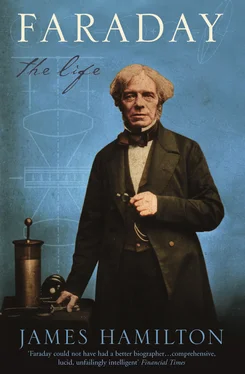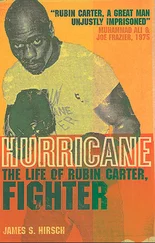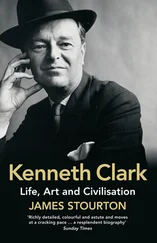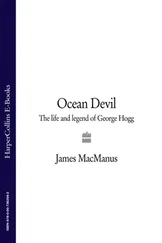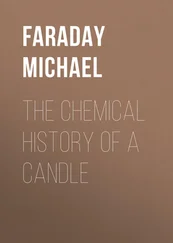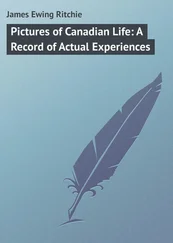In many of the towns he visited, Faraday sought out the bookshops, printers and bookbinders, looking back through them at his earlier, now abandoned, life. He wrote to Riebau: ‘My old profession of books has oftentimes occurred to my mind and been productive of much pleasure.’ 30He bought books at ‘every large town we came to’, but soon found he had accumulated too many, and had to deny himself, though he may have lost some of those he had bought somewhere en route. 31He tried to buy a French grammar in France, an Italian—English dictionary in Italy, and later in the journey an English—German dictionary, but try as he might, languages always had a tendency to elude him. He went to the theatre on two or three occasions, but never really understood the dialogue, unable to keep up with its relentless speed.
A recurrent and characteristic theme in the Journal is Faraday’s fascination for detail. There was the phosphorescence in the harbour mud at Morlaix; the analysis of a postillion’s equipment; the glow-worm on the road to Rennes; the telegraph at Montmartre; notices of the various methods of weighing goods in the marketplace, with comparisons between the English, French and Italian practices. Together, these and many other observations add up to an extended series of insights into continental life of a depth which would have graced any great travel writer of the nineteenth century – Richard Ford or Sir Richard Burton come to mind – and could have provided material for a painter on his travels. If Michael Faraday had achieved nothing else in his lifetime, this Journal would by now have had due recognition, and we would know him well as an incisive travel writer who sparkled once and vanished like a shooting star.
There is another beam along which we can take a fresh perspective on Faraday’s youthful life and character. This shines out from his letters home, to his mother, sisters, and principally to Benjamin Abbott. Each letter is heavily and opaquely overwritten, but they have an immediacy which time and revision might have blunted in the Journal. The first surviving letter, to Faraday’s mother, is dated 9 December 1813, six weeks after the party had arrived in Paris. 32The war frustrated the free flow of correspondence between France and England, and this letter was carried home by ‘a person who is now here, but who expects soon to part for England’. It is a short letter, a mere wave, with no news, just the apologetic ‘I could say much more, but nothing of importance.’
Margaret Faraday gets a longer letter four months later, from Rome, and it is from this that we can begin to take a new view of the journey. From the start there is a studied deference to Sir Humphry, which reflects the style of the pair’s day-to-day relationship: ‘by a high favour Sir H. Davy will put [this letter] with his own, and it will be conveyed by a particular person’. There are tiny hints of unhappiness such as a loving son might try to suggest to his mother, but not so much as to worry her. The journey had been ‘as pleasant and agreeable (a few things excepted, in reality nothing) as it was possible to be’. Faraday runs quickly over events in Paris, how Sir Humphry’s ‘high name’ in the city gave them easy access to everything they wanted to see, and how their passports were granted ‘with the utmost readiness’. He sweeps his mother down through France in a line or two, gives her a hint of the dangers of travel in a remark about their stormy passage between Genoa and Lerici, writes nothing about Florence, and tips her out at Rome, ‘in the midst of things curious and interesting’. But with this and the letter written a fortnight later to Benjamin Abbott, we begin to get additional information that adds depth to the Journal account.
They had been held up by bad weather in Genoa, while trying to take a boat across the bay to Lerici. Taking advantage of the delay Sir Humphry called on Professor Viviani, who had some electric fish in captivity, and tried to discover if the fishes’ electric charge was strong enough to decompose water; he found it was not, but nevertheless they gave some good shocks. 33The short voyage to Lerici was rough and dangerous, but it had the effect of silencing Lady Davy, who seems not to have stopped talking since they left England. Faraday was beginning to get fed up with her and her imperious ways, treating him like the servant he did not consider himself to be. In a later recollection Abbott wrote an account of what Faraday must have told him when he came home:
When in a boat in the Gulf of Genoa a sudden storm of wind … placed them for some time in some danger, and she (Lady D) was so alarmed that she became almost faint and in consequence ceased from talking. This, he told me, was so great a relief to him that he quite enjoyed the quiet and did not at all regret the cause that produced it, though the situation was for some time critical. 34
Passing through Italy, they drove into Lucca a day ahead of the English army that had landed at Livorno, and received a surprising and rapturous welcome. The entire town, waiting outside the gates, cheered and ululated as they trotted past. The crowd did not care that the carriage carried no guns to drive the French out; all that mattered was that the passengers were English, and grandees too apparently, smiling and waving as they passed along the line of people. To Abbott Faraday wrote:
… since we have left the French dominions we have been received with testimonies of pleasure & gratitude as strong as it was possible for the tongue to express. At Lucca we found the whole population without the gates waiting for the English … The town was decorated in the most brilliant manner by colours, drapery and embroidery flying from every window, & in the evening general illuminations took place done as expressive of their joy at the deliverance from the French government, & the English were hailed everywhere as their Saviours. 35
They arrived in Florence flushed and delighted. It was a glorious morning, enhanced by the good fortune of finding the best hotel, ‘a Palace both outside and inside’, as Faraday described it, 36and that is probably just what it was. For the next two days he took himself off on his strolls about town. He discovered the River Arno, admired the bridges, particularly Ponte Santa Trinità, with its ‘air so light and free one can scarcely imagine it to be of stone’. 37He walked to the Duomo, the Baptistery, considered climbing Giotto’s campanile for ‘the finest possible view of Florence & the environs’, and then on to the Piazza Signoria. The bronzes in these public areas caught his eye particularly – the Baptistery doors, ‘bronze and most beautifully cast’; in the square ‘the bronze is a fine figure of Perseus with the head of Medusa’.
The great object of the visit to Florence was to go with Sir Humphry to see the scientific instruments formerly in use at Accademia del Cimento, once the working place of Galileo, and by now in the Museo di Storia Naturale. Faraday told Abbott all about it: ‘here is a fine Museum of Natural History containing an immense quantity of things curious & instructive and some wax works in anatomy & botany of the most delicate kind. The collection of apparatus is numerous and rendered invaluable by the instruments of Galileo & the Duke of Tuscany.’ 38
He goes on to describe the telescope with which Galileo discovered the moons of Jupiter in 1610, the ‘vast quantity’ of electrical machines and apparatus, the magnets – one of which could support a weight of 150 pounds 39– and particularly the great lens that Grand Duke Ferdinand III had commissioned. There were minerals, shells, insects, and stuffed birds and their eggs. The last room ‘contains some singular specimens of carving and modelling representing the horrors of death in the Plague and in a sepulchre. There were some Egyptian mummies in the room, one of them opened.’ 40
Читать дальше
